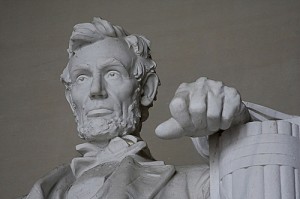
By Jake “The Movie Guy” O’Bannon, Columnist
Almost one year ago to the date I wrote a review over “The Muppets.” In that review, I talked about my trip to the theatre with my grandfather, father, and brother and how that particular film appealed to all three generations. Maybe it’s the Thanksgiving season, but I had a similar experience this year with a very different movie.
I am going to make a judgment call here and assume you know what Lincoln is about. Rather than doing that, I want to tell you about how this incredible man was portrayed in Steven Spielberg adaptation of the 16th President’s life.
Abraham Lincoln, played by Daniel Day-Lewis, was well-liked by the majority of Americans toward the end of his first term as President. He was a kind man, he appealed to the masses, and he made decisions that we able to bring together party lines. That last characteristic changed quickly though when he tried to abolish slavery.
Lincoln’s path to the abolishment of slavery is essentially what the film is all about. As an American who has learned the story though textbooks and teachers, I was opened up to a whole new perspective of the story through Spielberg’s portrayal. History tells us about the events, but the film tells us about the man.
The man was someone who cared more about the masses than he did himself. “Lincoln” really puts you in his shoes through the entire process. We find that it was not just the South that was against his decision, but there were people in his own cabinet that were against him. One of my favorite elements of the film, and it was a part that often gave comic relief, was when a heated discussion would be taking place and Lincoln would calm everyone down by telling a humorous story. His audience would always be confused and a bit displeased when he would start, but the story would bring the group together every time without fail. It was scenes like these that told the story of the man behind the legacy.
One of the main criticisms of this film is that it moves slowly and does not have the action that the public was expecting. I must say, that analysis could not be more false. I understand why people are saying that though, because the action that filled this film is almost non-existent today. The action present came through the life of Abraham Lincoln and what he stood for. Lincoln was a man of action – he believed strongly in something, and instead of strictly having a strong belief, he combined belief with action to create change.
My grandfather was moved by this film, as should anyone be who watches it. Afterwards, he came up to me and told me that this is the kind of change we need today. He reminded me that Lincoln was a man who believed in something so strongly that he would not rest until he saw it happen. I will not soon forget my grandfather’s words, because he is right. Today we seem to lack one important factor in the change equation. We have the beliefs (and we sure are passionate about our beliefs, aren’t we?), but we lack the action step. We should take a lesson from Abe on this one; change requires more than just belief. It requires action.
Go see this movie. I promise you won’t be wasting your time. And with this being the last issue of the semester, it seems like a good time to give you some movie suggestions for the Christmas season. It’s very simple; after you’re done watching “It’s a Wonderful Life,” go see these two movies: “The Hobbit,” and “Les Miserables.” Easy assignment, right?
Have a great Christmas!